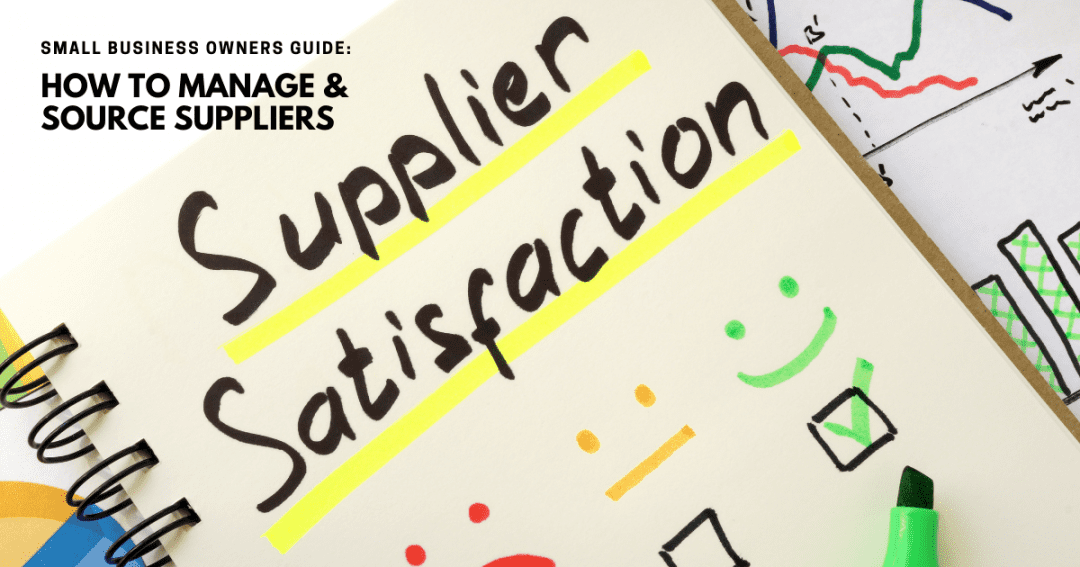Your relationship with your suppliers is important to the success of your business. Understanding how best to source suppliers, build a relationship with them and manage that relationship will help to put you in a good position. And that in turn will allow you to manage and grow your business when you’re ready.
Why do you need suppliers?
Most businesses rely on suppliers of one sort or another. It may be the company that manages your IT; it could be a supplier that delivers components for your products; it might be the person who services your production equipment. Businesses need suppliers of all shapes and sizes. And because your business relies on these suppliers, you need to make sure that you source them carefully, and manage the relationship well – the last thing you need is to lose a key supplier because of poor relationship management.
So here is our quick guide, highlighting our advice on how you can get off to a great start with your suppliers, and manage them yourself, or with virtual administration services.
Source your suppliers carefully
It can be tempting to sign up with any supplier, so that you can keep your business moving. But it’s important that you take the time to choose a supplier who you know you can rely on – both in terms of the goods or services they are supplying, and in terms of their service levels. Things to consider include:
- Personal recommendation – if you are networking consistently, you may find that there’s a good supplier in your network, or that other businesses recommend suppliers they use. This is a great starting point. Businesses like to get work via referrals, and because you have a relationship with their existing customers, it makes sense that they will want to do the best job for you.
- Meeting standards – you’re going to want to make sure that your supplier is able to maintain a good supply and a good service. Depending on your supplier, there may be an industry body or organisation that regulates the service, and if your supplier is a member, they will need to abide by the expectations of that body. They may also choose to certify to ISO 9001 – a standard that sets out the criteria for a quality management system. It takes time and organisation to become certified, and it gives you confidence that your supplier is taking its business and its customers seriously.
- Meet the supplier – the best way to get an idea of whether you can build a relationship with a potential supplier is to meet them face-to-face if you can. This could be with a visit to the company, or a meeting on neutral ground. If your supplier is manufacturing or handling goods in a particular way, you might want to see how things are done and meet the team. For other suppliers, it may be enough to meet the person who would be your account manager. If you are working with a virtual assistant who will be managing the supplier relationship, it may be a good idea to include them in these meetings too.
Put together a Service Level Agreement
You’ll want to choose a supplier that can meet your particular needs. This may be for speed of supply, discounts on orders above a certain amount, technical support and more. Whatever basis you select your supplier on, you’ll need to be sure they can deliver.
It’s standard practice to put a Service Level Agreement (SLA) in place when you work with a new supplier. An SLA doesn’t need to be long or complicated – it just defines the business arrangement with your supplier, and it protects both parties. Usually, it determines the major responsibilities of each party and covers issues including problem management, compensation, warranties and remedies, resolution of disputes and legal compliance. Whilst you’re unlikely to get as far as needing legal proceedings to rectify an issue with your supplier, the SLA will be extremely useful if you do.
Managing your relationship
If your business makes fairly constant use of suppliers, you may want to consider getting some help to manage the relationships. This is the type of work that can be handled by a good part time administrative assistant, or by outsourcing to virtual administrative services. Clear and open communications are important, as is ensuring that you keep to your own commitments in the SLA – ordering with enough lead time, paying on time, talking directly to the supplier if there are any issues and giving them first option on any increase in quantity or diversification in product/service. You want to be a business that is important to your supplier and that they enjoy working with. That way, you can help to ensure great service and even flexibility when you need it.
Your supplier is really a part of your extended team, treat them well and they will support your business to flourish. From the way you source suppliers to ongoing management, making the right choices will give you a clear support network, and the foundation you need for your business to grow successfully.
If you’re short on time and need help managing your supplier network, feel free to call us on 0800 994 9016 or use our contact form in the menu above.

